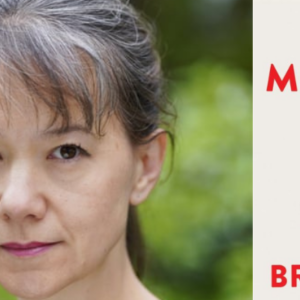Lit Hub Asks: 5 Authors, 7 Questions, No Wrong Answers
Featuring Ed Park, Lindsay Hunter, E. J. Koh, and More
The Lit Hub Author Questionnaire is a monthly interview featuring seven questions for five authors with new books. This month we talk to:
Jesse David Fox (Comedy Book: How Comedy Conquered Culture—and the Magic That Makes It Work)
Lexi Freiman (The Book of Ayn)
Lindsay Hunter (Hot Springs Drive)
E. J. Koh (The Liberators)
Ed Park (Same Bed Different Dreams)
*
Without summarizing it in any way, what would you say your book is about?
Lindsay Hunter: Murder. Sex. Dieting. Young love. Jail. Codependent relationships. Neighbors. The banality of horniness. Remembering you have a body. Bodies. A body. Ghosts.
Jesse David Fox: Can I say “comedy”? It is about comedy, the art form. Not like the jokes you make with your friends and family. Actually, it’s kinda about that too.
E. J. Koh: The willingness to be broken for that which one was not to blame.
Ed Park: The Korean Provisional Government, apocryphal role-playing games, the Buffalo Sabres, secret societies, the ‘80s, the ‘90s, the ‘00s (2000s and 1900s), war, utopia, pillow talk, the movies.
Lexi Freiman: Selfishness, altruism and objectivism as applied to sex with much younger men.
Without explaining why and without naming other authors or books, can you discuss the various influences on your book?
Lexi Freiman: I was influenced by the ideas of Ayn Rand but also her sex life and, let’s be honest, my own sex life. But I also made a lot of stuff up!
Ed Park: The Korean War and the 1999 Stanley Cup Finals.
Lindsay Hunter: Keith Morrison. That ‘90s shade of brown that was everywhere in suburbia. Tiled rooms. Motherhood. Gen X and boomer dieting culture. The way the mind floats outside the body, the sonic boom when they finally unite.
Jesse David Fox: The Matrix, The Matrix: Reloaded, The Matrix: Revolutions, the musical Passing Strange, remixes to indie rock songs from the late ‘00s and early ‘10s, this series the photographer Alec Soth did at a Laughing Yoga school in India, those specials in the ‘90s where that masked guy revealed how magic tricks were done, resentment towards one sentence in a review of a comedian by a writer I respect who doesn’t normally write about comedy, the episode of The Simpsons where Dustin Hoffman plays Lisa’s substitute teacher, blogs and blogging.
E. J. Koh: The fragility of the human condition. Tendering the spirit—freeing myself of what cannot be mine.
Without using complete sentences, can you describe what was going on in your life as you wrote this book?
Ed Park: Fatherhood, new job, stories but no novel, another job, Instagram, moving, pandemic, friends dying, moving again, K-dramas, Peloton, new desk, remembering, remembering, remembering.
Lindsay Hunter: A global pandemic. My pit bull’s illness. Terror. So much love. A lot of idling the car in parking lots. A lot of folding inward. Nature.
Jesse David Fox: Pandemic, baby.
E. J. Koh: The world shattering in slow motion like a windowpane.
Lexi Freiman: Moved to LA, got depressed, found meditation, pandemic hit, moved to Australia, got depressed, repeat.
What are some words you despise that have been used to describe your writing by readers and/or reviewers?
Jesse David Fox: I despise all versions of “you’re cutting up a dead frog” so much that I essentially built a career in spite of it. Also, I don’t like when people misspell my name as “Jessie.”
Lexi Freiman: A reviewer once asked if my book was “helpful” to a social cause, which helped clarify the suspicion I feel toward any book that is helpful to a social cause.
Ed Park: “Clever.” (I don’t actually know that it’s been used, but consider this fair warning.)
Lindsay Hunter: “Too dark.” “I don’t know why I had to read this.” “Gross.” “Not dark enough.” “Hateful.”
E. J. Koh: “I wouldn’t have left you all alone.”
If you could choose a career besides writing (irrespective of schooling requirements and/or talent) what would it be?
E. J. Koh: Architecture of threshold spaces—interstitial hallways, stairs, entryways.
Lindsay Hunter: Dog psychic. Britney Spears’s assistant. Britney Spears’s dog psychic.
Ed Park: Hockey player.
Jesse David Fox: Cofounder of a start-up that operates a fleet of rotisserie trucks that pop up at farmers markets around New York City. We’d sell chicken and potatoes at first, but overtime we might do roast beef and like a porchetta or something.
Lexi Freiman: Spiritual guru or hip hop dancer.
What craft elements do you think are your strong suit, and what would you like to be better at?
Lexi Freiman: Writing about poop; writing about plants and flowers.
Lindsay Hunter: I think I’m very good at imagery. I think I’m very good at the sentence level. I am good at character and dialogue and relationships. I would like to be better at place, at subtlety, and at allowing more grace and joy into the narrative.
Ed Park: Jokes, twists, clues that pay off on a second read, the use of nonliterary forms (emails, transcripts, etc.). On the flip side, it might be fun to write a slim, traditional-looking book that only has one font.
Jesse David Fox: In so much as being easy to read is a good thing, I’m pretty good at making complicated ideas go down easy. I write a lot in the book about the subjectivity of funniness, so I’d NEVER say I’m funny, but I have “voice.” After reading the audiobook, I vowed to never write a long sentence again. Also, I would love to be able to describe the appearance of something and have people think it was beautiful, but I have aphasia and I literally cannot picture anything in my mind. And basic grammar skills.
E. J. Koh: I can fold the blankets like hospital sheets. The holy word—light.
How do you contend with the hubris of thinking anyone has or should have any interest in what you have to say about anything?
Jesse David Fox: 15 years ago I wasn’t a writer. I was working for a major talent agency and I was very bad at it. My friend Dawson said I should start a blog, so I did. Well, I thought, I wasn’t being self indulgent, I was being Dawson-indulgent. That’s what I kept on doing: Just focused on writing for the specific individual/s who requested I write the thing and tried not to think about the hypothetical other people who would or wouldn’t be interested. My agent, Adam Eaglin, is brilliant and caring, so I tried to write the proposal for him. Then I met my editor, Jackson Howard, and thought he was so smart and cool and powerful, so I worked really hard to impress him. Adam and Jackson seemed to like the book, so that makes me think people might be interested.
Lexi Freiman: No one should really be interested in anything but the silent emptiness of the mind. So I don’t worry about it.
Lindsay Hunter: That’s a tough one! It’s something I have to fight through all the time. What I usually do is get very micro. I focus on the actual making of the thing. I remember what I love about it, what is fun to me about it, what I love reading in other people’s work. I remember that I am a voracious reader and can’t imagine a life without books. I remember who I am, and I write from there.
E. J. Koh: My gaze opens and bandages of doubt fall from my face.
Ed Park: I only do this every fifteen years, so everything I say is important.




















